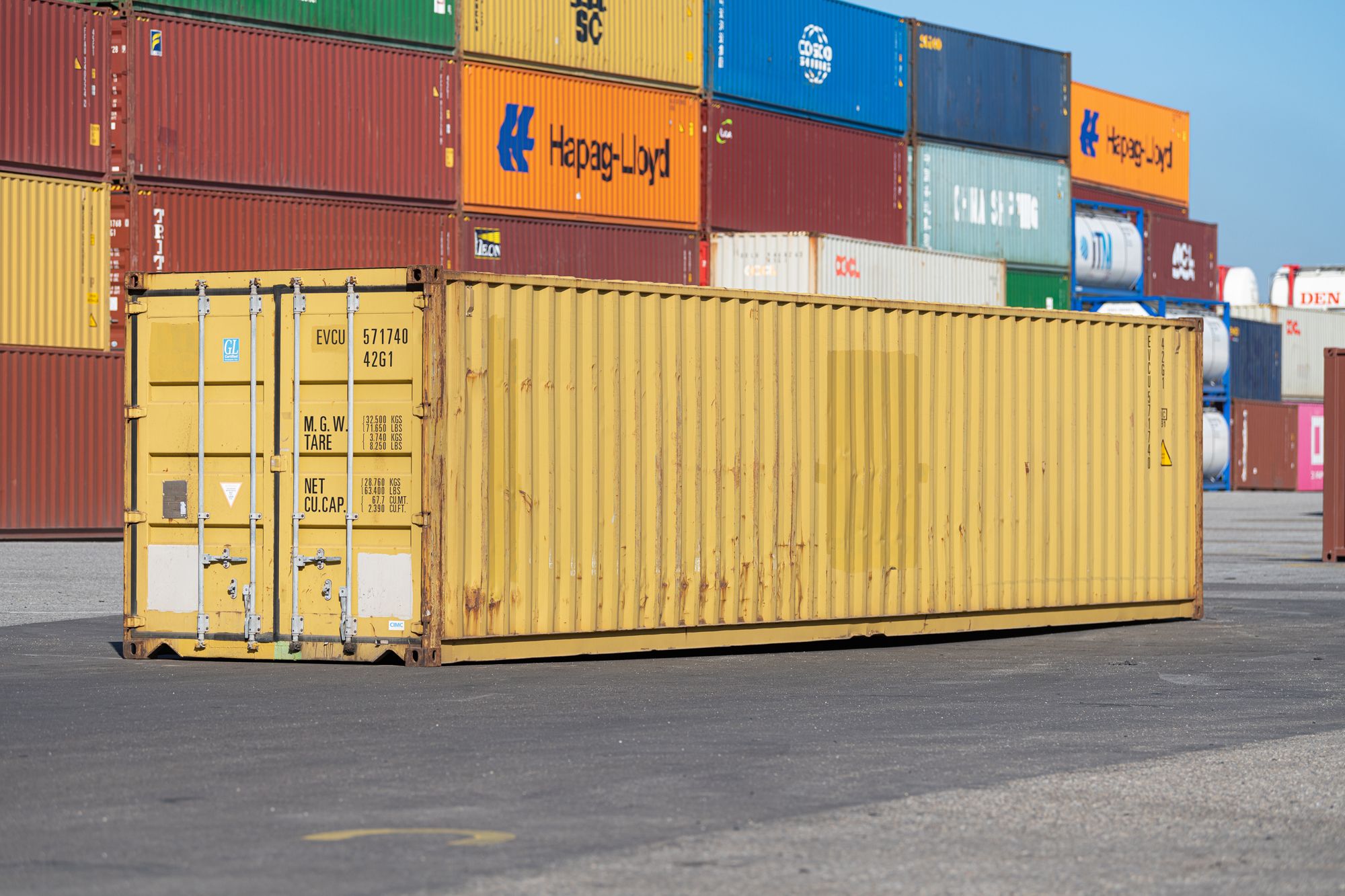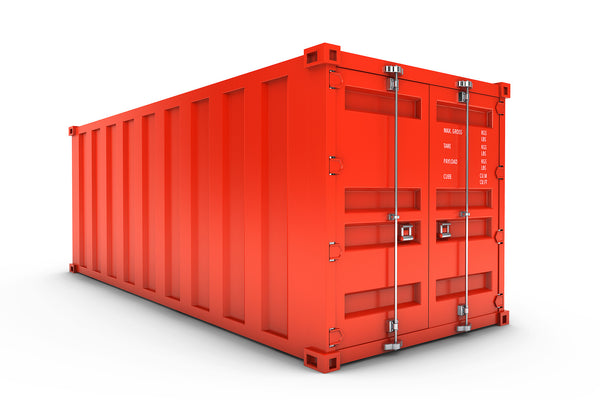7 innovative ways to repurpose Shipping Containers in hospitality
Whatever You Need to Understand About Shipping Containers and Their Practical Applications
Shipping containers have developed from mere devices for transportation to versatile structures with numerous useful applications. Their robust style and typical sizing make them suitable for a series of usages past delivery. From innovative housing solutions to sustainable farming, their versatility is noteworthy. Yet, the possibilities do not end there. Discovering their numerous features exposes unexpected understandings into contemporary difficulties and creative remedies. What other duties could these containers play in today's globe?
The Design and Structure of Shipping Containers

Internally, containers are made to optimize room, typically featuring wooden or steel flooring that can support considerable weight. Air flow systems might be integrated to avoid moisture accumulation, which is crucial for sensitive freight. Additionally, reinforced edges enable very easy handling by forklifts and cranes, assisting in smooth loading and dumping. This thoughtful layout and framework add to the containers' versatility throughout various shipping and storage space applications.
Benefits of Using Shipping Containers
While numerous transportation techniques have their advantages, the usage of shipping containers sticks out due to their unrivaled convenience and performance. Shipping containers offer a standard dimension, making them simple to transfer and stack across numerous settings of transport, consisting of vehicles, ships, and trains. This standardization minimizes packing and dumping times, therefore boosting general performance.
Additionally, shipping containers are created from resilient materials, supplying robust protection for goods throughout transportation. They are weather-resistant and safe, reducing the risk of damages from ecological elements or burglary. In addition, the modular layout of shipping containers permits for easy modification, allowing companies to adapt them for different objectives, such as storage or mobile workplaces.
Their transportability and cost-effectiveness make delivery containers an attractive choice for organizations looking to enhance logistics and supply chain operations. These advantages contribute to the growing popularity of shipping containers in various sectors.
Creative Housing Solutions With Shipping Containers
Cutting-edge housing remedies have actually emerged as an amazing application of delivery containers, leveraging their integral toughness for residential use. These versatile frameworks provide a lasting choice to conventional building materials, often at a portion of the price. Designers and developers have transformed containers right into trendy, functional homes, dealing with diverse way of lives and choices.

Shipping containers are environmentally pleasant, advertising recycling and decreasing waste. Many jobs focus on power effectiveness, including eco-friendly roofing systems and solar panels. As urbanization boosts, these cutting-edge real estate solutions present a sensible reaction to housing shortages while promoting an unique building aesthetic.
Shipping Containers in Retail and Pop-Up Shops
A growing number of retailers are turning to shipping containers as a vibrant option for retail areas and pop-up shops. These versatile frameworks use an economical alternative to typical stores, allowing businesses to produce one-of-a-kind, appealing settings that draw in customers. Their modular style enables simple transport and setup, making them ideal for short-lived or seasonal retail places.
Stores can personalize delivery containers to show their brand identity, changing them into aesthetically appealing stores that attract attention in crowded marketplaces. The small nature of containers also encourages reliable use room, enabling innovative designs that optimize client circulation and interaction. Additionally, shipping containers can be located in unique locations, such as city parks or vacant lots, boosting ease of access and foot traffic.
As the retail landscape progresses, delivering containers provide a flexible and ingenious remedy that fulfills the needs of modern customers while enhancing the purchasing experience.
Lasting Farming Practices Using Shipping Containers
Sustainable farming techniques significantly include delivery containers as ingenious remedies for agriculture - Shipping Containers for Sale. These container farms use hydroponics to maximize area and resource effectiveness, providing a cost-effective method to food manufacturing. By transforming shipping containers right into farming centers, farmers can address food protection and environmental concerns at the same time
Container Farming Advantages
While standard farming deals with obstacles such as land scarcity and climate adjustment, container farming provides a feasible alternative that takes full advantage of room and sources. This cutting-edge method permits year-round crop production in controlled environments, decreasing reliance on weather problems. Container farms use much less water than conventional farming, advertising sustainability and conservation. They can be developed in metropolitan areas, bringing fresh produce closer to customers and decreasing transport emissions. In addition, the modular nature of shipping containers enables scalability, enabling farmers to change operations based upon need. Container farming additionally reduces chemical usage by creating a confined community, inevitably enhancing food safety. As city populations grow, container farming becomes a practical remedy to meet the increasing need for regional, sustainable food sources.
Hydroponics in Containers
Hydroponics, which permits plants to grow without dirt by utilizing nutrient-rich water, prospers within the boundaries of delivery containers, making it an optimal method for metropolitan farming. These containers develop a controlled environment that maximizes light, temperature, and moisture, enabling year-round growing. With restricted room in metropolitan locations, shipping containers use a scalable service for expanding fresh produce. Hydroponic systems within containers can consist of numerous strategies, such as nutrient film method (NFT) and deep water society (DWC), which make best use of return while minimizing water use. This innovative method not just improves food security but additionally reduces the carbon impact connected with traditional farming approaches. Hydroponics in containers represents a forward-thinking service for lasting city food production.
Cost-Effective Farming Solutions
As food manufacturing deals with enhancing challenges because of climate change and urbanization, shipping containers emerge as an affordable service for agriculture. These versatile structures can be repurposed for numerous lasting farming techniques, such as hydroponics and upright farming. By using regulated atmospheres within containers, farmers can optimize growth cycles and lower resource intake, including water and fertilizers. Furthermore, delivering containers can be strategically put in urban locations, reducing transport expenses and improving access to fresh fruit and vegetables. Their modular nature permits for scalability, allowing farmers to expand procedures as need expands. Moreover, repurposing containers adds to throw away decrease, lining up with eco-friendly agricultural efforts. On the whole, delivering containers present innovative chances visit this site for effective and lasting food manufacturing.
Emergency and Catastrophe Alleviation Applications of Shipping Containers

Organizations regularly make use of shipping containers to create mobile facilities or field healthcare facilities, making sure that treatment reaches those in need. Furthermore, they can be transformed right into command centers for coordinating rescue procedures, thereby boosting business efficiency during dilemmas.
Containers can be modified to store essential items such as food, water, and clothes, safeguarding supplies up until they are dispersed. Their wheelchair permits them to be easily delivered to numerous places, making certain that assistance gets here where it is most urgently required. Generally, shipping containers play a critical role in improving the performance of catastrophe alleviation campaigns worldwide.
Regularly Asked Inquiries
Exactly How Are Shipping Containers Transported From One Location to An Additional?
Shipping containers are transported using trains, vehicles, and ships, making use of cranes for packing and unloading. This multi-modal transportation system makes sure reliable motion throughout land and sea, check my reference connecting international supply chains and helping with worldwide profession.
What Is the Ordinary Life-span of a Shipping Container?
The ordinary lifespan of a delivery container usually varies from 10 to 25 years, relying on upkeep, usage, and ecological aspects. Proper treatment can expand their use, while disregard may result in deterioration and damage.
Can Shipping Containers Be Modified for Various Usages?
Yes, shipping containers can be changed for various uses. They offer as homes, offices, pop-up shops, and storage devices. Their flexibility permits innovative adjustments, making them suitable for a variety of applications.
Are Shipping Containers Eco-friendly?
Shipping containers basics can be eco pleasant, as they promote repurposing and recycling. Their sturdiness reduces waste, while their usage in alternate real estate and organizations lessens the demand for new products, adding to lasting techniques.
Just how Do I Choose the Right Size Shipping Container?
To pick the best size shipping container, one must examine storage requirements, consider the designated use, and review area schedule - shipping containers for sale near me. Usual sizes consist of 40-foot and 20-foot containers, each serving numerous storage space and transportation demands effectively
Cutting-edge real estate solutions have actually emerged as an amazing application of shipping containers, leveraging their integral strengths for property usage. The versatility of shipping containers allows for imaginative formats, from single-unit houses to intricate multi-container arrangements. Sustainable farming practices significantly include delivery containers as innovative services for farming. Furthermore, the modular nature of shipping containers enables scalability, permitting farmers to change operations based on need. Hydroponics, which enables plants to expand without soil by utilizing nutrient-rich water, grows within the confines of shipping containers, making it an optimal method for metropolitan agriculture.